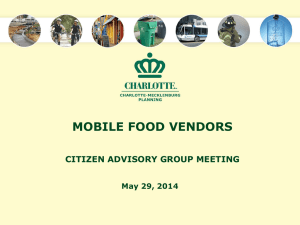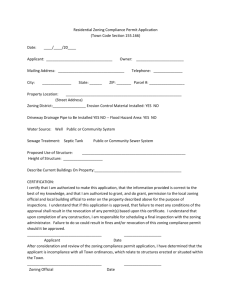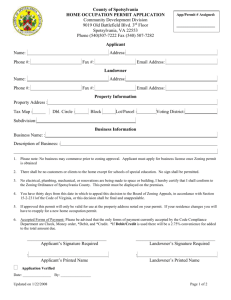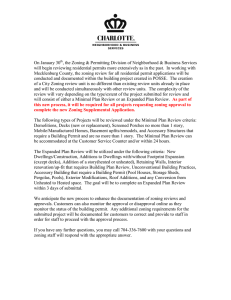MOBILE FOOD VENDORS CITIZEN ADVISORY GROUP MEETING April 29, 2014
advertisement
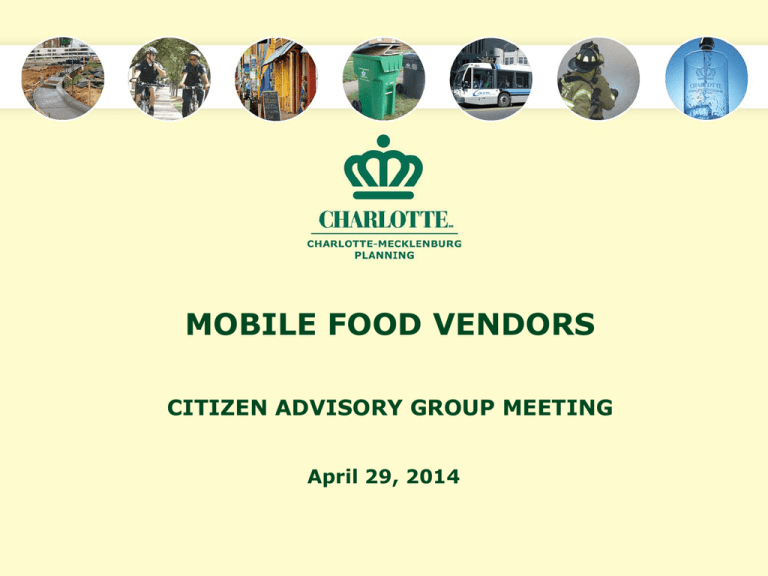
MOBILE FOOD VENDORS CITIZEN ADVISORY GROUP MEETING April 29, 2014 AGENDA • • • • • • • • Welcome & Introductions Purpose and Process Recap of April 3, 2014 meeting Concerns Current Regulations Updated Recommendations Questions and Feedback Next Steps PURPOSE PROCESS Through a citizen advisory group process, Planning staff will explore current mobile food vendor regulations and possibly modify the regulations that allow the use in Charlotte. Citizen Advisory Group Meetings Staff Recommendation Public Hearing City Council Decision PROCESS FLOWCHART Another Advisory Group Meeting? Public Hearing September 15, 2014 Meeting #5 May 29, 2014 City Council Workshop May 5, 2014 Planning Commission Zoning Committee, September 24, 2014 Mobile Food Vendors Text Amendment Process Meeting #1 January 30, 2014 City Council Decision October 20, 2014 Meeting #2 Meeting #4 April 29, 2014 March 11, 2014 Meeting #3 April 3, 2014 Text Amendment Process Citizen Advisory Group Role of Citizen Advisory Group Members: • Help identify issues and concerns • Help identify possible solutions • Provide feedback on staff recommendations • Attend and participate in meetings Role of Staff: • Educate and inform • Help identify issues and concerns • Help identify possible solutions • Develop staff recommendations • Listen to Citizen Advisory Group Members issues and concerns • Present staff recommendations and bring forward any outstanding issues to City Council Text Amendment Process Citizen Advisory Group Role of Planning Commission • A member is assigned to attend Citizen Advisory Group meetings and reports back their observations to the full Commission • Members of the Planning Commission’s Zoning Committee attend public hearing on text amendment • Members of the Zoning Committee meet and make recommendation that is forwarded to the City Council • Members of the Zoning Committee attend public hearing where decision is made by City Council LAST MEETING RECAP • Length of permit • Allow flexibility to move around • Vendor location – in front of restaurants – on public property – in business and office parks • Hours of operation • Separation requirements – from other mobile food vendors – from residential use in residential district LAST MEETING RECAP TYPES OF LOCATIONS FOR MOBILE FOOD VENDORS – PRIVATE PROPERTY – CENTER CITY PARTNERS – STREET RIGHT-OF-WAY ADDITIONAL DIALOGUE • Food Truck Petition • Community Communications • New Stakeholders CONCERNS • Special events – – – – School festivals Charter schools Community and Neighborhoods events Private parties (where the food truck is set up for 30-60 minutes in residential areas). • More than 3 mobile food trucks congregating on site CONCERNS • Hours of operation • Separation – Next to an eating, drinking or entertainment establishment – Permission from property owner CURRENT REGULATIONS Definition Mobile Food Vending Service A service establishment operated from a licensed and moveable vehicle that vends or sells food and/or drink processed or prepared on-site to walk-up customers. Current Regulations Section 12.510. Mobile food vending services. 1. Not allowed in required setback, sight distance triangle, or required buffer. 2. Requires a zoning use permit. Maximum duration - 30 days renewable twice. Maximum time period 90 days per year. 3. Proof of property owner or designated agent permission 4. If issued a notice of violation at the location operator not eligible to renew at that location for the rest of the year. 5. Trash receptacles must be provided Current Regulations 6. Vendor must remove trash at the end of each business day. 7. Hours of operation are from 8:00 a.m. until 9:00 p.m. 8. One parking space per 250 square feet of the mobile food vending unit required. Additional parking may be required. 9. Not excluded from other requirements 10. No access from a Class V (collector), Class VI, (local), or Class VI-L (cul-de-sac) street. Current Regulations 11. A minimum 400’ separation from other mobile food vendor and a minimum 400’ separation to a residential use. 12. A zoning use placard must be posted 13. All applicable local and state codes shall be met. 14. Exemptions for a. Special events b. Non-profit, fundraising events of 5 days or less ORIGINAL RECOMMENDATIONS Highlights of Original Proposed Changes Create flexibility in permitting by allowing a maximum of three (3) locations per permit. Extend the time period for a permit from 30 days up to 3 times a year to one permit valid for one (1) calendar year for every 3 locations. One mobile food truck may locate on a property at a time with the exception of special events or locations under prescribed conditions. Limit clustering of 4 or more to one event per week. Extend the hours of operation from 8 am – 9 pm to 6am midnight except when located 200’ of a residential use, in which case the hours of operation are limited from 7 am – 10 pm. Highlights of Original Proposed Changes Create separation distance of 100 feet from the entrance to any eating, drinking or entertainment establishment, or restaurant, nightclub, or bar. Reduce the separation requirement between mobile food vendor to 20’ when located on the same parcel. No separation when located on different parcels. Reduce the separation requirement of mobile food vendors from 400 feet to 150 feet from a residential use in a residential district. Note that the mobile food vendor must return to the commissary as required by state law. UPDATED RECOMMENDATIONS UPDATED RECOMMENDATIONS Suggestion Recommendation Rationale Allow mobile food trucks as a use in the office zoning districts. Allow use on office planned development sites in the office district on a lot with a building of at least 30,000 square feet. Restaurants are not permitted in the office district except within a building on a lot with at least 30,000 of floor area. Expand the hours of operation for a mobile food truck. Change hours of operation To provide more opportunity for from 8:00 am - 9 pm to 6:00 sale of breakfast and dinner items. am – midnight with the mobile food truck leaving the site no later than midnight. Allow food trucks Food trucks would be allowed for special events at in residential community/neighborhood districts events and at after school special events Retail and restaurant use are not permitted in residential districts. Food truck will be allowed for special events with a permit UPDATED RECOMMENDATIONS Suggestion Recommendation Rationale Separate mobile food vendors from restaurants, but not from nightclubs or bars that do not sell food Maintain a 50- foot separation Balance competing interests of brick from any restaurant, nightclub or and mortar buildings and food trucks. bar or eating, drinking or entertainment establishment. All gathering of mobile food trucks Allow four or more food trucks in one location if a special permit is obtained. Due to the potential for large pedestrian turnout as well as vehicular traffic there is a need to ensure public safety and prevent secondary impacts to adjacent properties. Do not limit days that mobile food trucks may gather. Remove the limit on the number of days If the property meets the development standards then the use should be allowed without restrictions. Increase number of locations allowed per permit. Allow one permit for 3 locations In an effort to reduce the permitting cost, up to three locations may be included on one permit. In the past the requirement has been one permit per location. Feedback and Questions Next Steps Planning Department – Draft a text amendment to the Zoning Ordinance to modify requirements for mobile food vendors. Council will be made aware of any outstanding concerns. Citizen Advisory Group Meetings May 29, 2014 Room 267 CMGC Next Steps City Council Hearing and Decision September 15, 2014 September 24, 2014 City Council Public Hearing Staff presents recommendation and any outstanding issues Proponents and opponents can sign up to speak Citizens may also speak with Council Members prior to or after the hearing. Planning Commission – Zoning Committee Zoning Committee Meeting and Recommendation to Council Citizens may speak with members prior to or after the hearing October 20, 2014 City Council Decision
